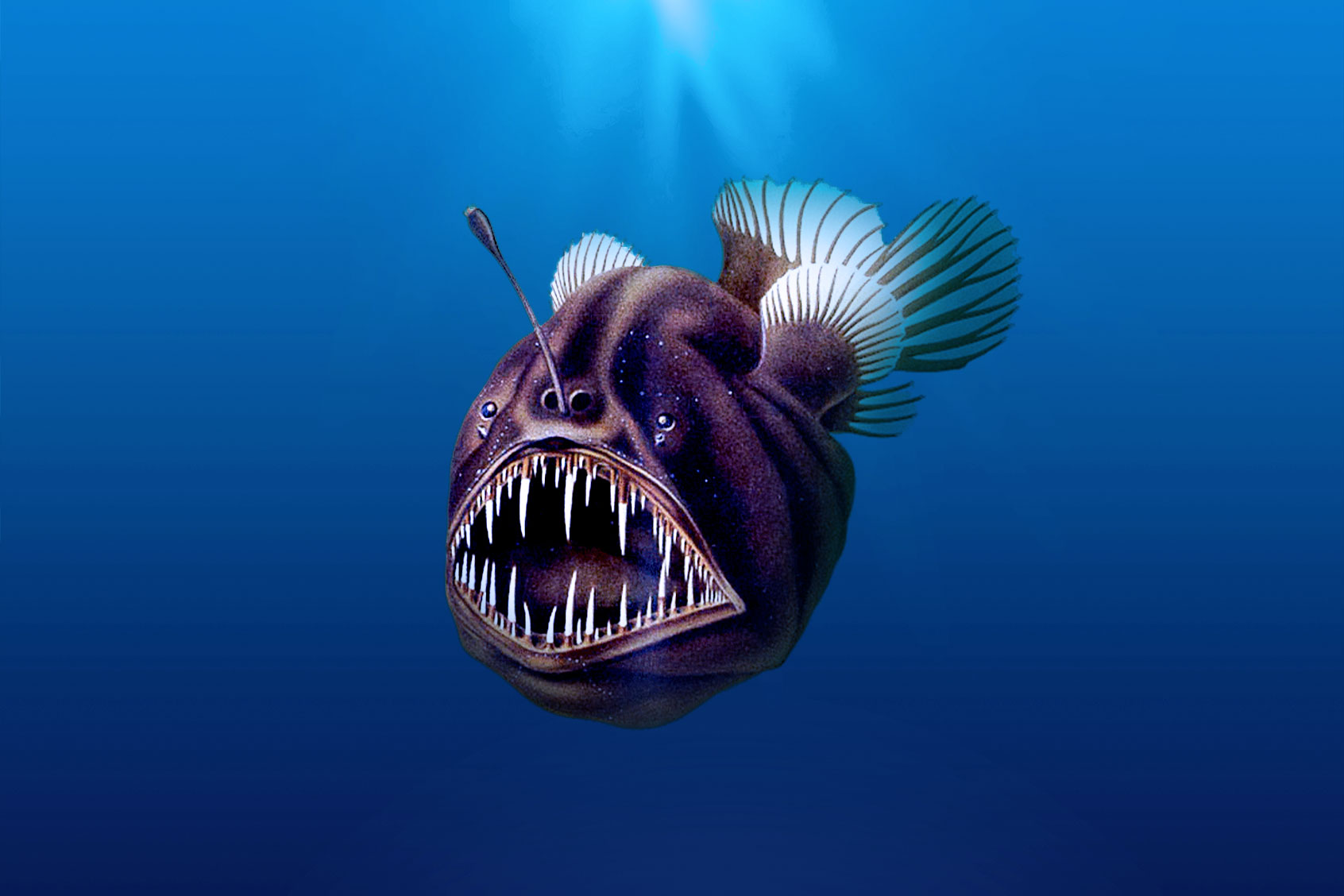The latest animal to go viral isn’t a baby hippo or newborn tapir or anything that cute really: it’s a humpback anglerfish (Melanocetus johnsonii) that was spotted in shallow waters off the coast of Spain. If you know anything about this kind of fish besides the fact that it has a lantern on its head, it’s that it doesn’t belong in brightly-lit waters — like blind cave salamanders and earthworms, it is a creature of the deep and dark.
But seeing it floundering in a glittering blue void quickly infatuated the internet. Because anglerfish need to stay in deep waters to survive (nearly 5,000 feet or 1,500 meters), it is rare for them to reach the surface unless they are sick. Indeed the anglerfish, famous for its razor sharp teeth and bioluminescent lure used to snag prey, died only a few hours after the scientists spotted it. But it was the only documented time humans have seen this fish in this part of the sea. Captured by the underwater photographer David Jara Boguñá, the fish has since found its way all over Reddit, Bluesky and YouTube, with coverage ranging from CBS News, CNN and Oceanographic Magazine.
Now the scientists — who were researching pelagic sharks at the country’s Canary Islands — are going to study the anglerfish’s body, hoping to learn more about its uncharacteristic behavior. Regardless of what they find, experts agree that the anglerfish’s plight is a sign that people should be mindful of the health of our planet’s oceans, which are heating at an unprecedented rate in human history. That begs the question: is the reason this anglerfish was a stranger in a strange land because of climate change?
“The deep open ocean is a sensitive environment and changing temperatures would essentially shift the balance of the ecosystem that anglerfishes have adapted to exploit,” Chase Brownstein, a research associate at Yale University’s Ecology and Evolutionary Biology program, told Salon. “Basically, warming oceans are bad for animals for a variety of reasons, mainly because they are used to a certain temperature range and pushing the limits of that range can put species under metabolic or physiological stress.”
Even though the anglerfish’s surfacing can raise awareness about ocean pollution, this does not mean we know for sure it did not rise for natural reasons. Ben Frable, the University of California San Diego's Senior Collection Manager of Marine Vertebrates, said that anglerfish surfacing events are not as uncommon as one might think.
"The deep ocean is impacted by climate change similar to the shallow ocean — decreasing oxygen, increasing acidity and temperature will all have profound impacts."
“Just off the bat, it is not unheard of to see mesopelagic (200-1,000 m depth) in shallow waters, especially around offshore islands like the Canaries and Hawaii,” Frable said. “Many mesopelagic organisms vertically migrate into shallower water at night to feed in the more productive shallow waters. As far as we know, anglerfish generally do not vertically migrate as adults but this fish could have come shallow for a myriad of reasons.”
With that caveat aside, Frable observed a crucial difference between this particular anglerfish and others that surface — it looks sick.
“As many folks have commented, this fish doesn't seem to be in the best shape, so it could be disoriented from entering shallow, well-lit waters or sick or dying,” Frable said. “Another type of anglerfish, the footballfishes, are known from individuals entering shallow water and being found barely alive or dead washed up on beaches.”
Rafael Banon Diaz, an ichthyologist at the Universidade De Santiago De Compostela, also told Salon that the individual fish in question is “already dead” and that although not all surfaced anglerfish are sick, “these anomalous records are normally sick specimens.”
Want more health and science stories in your inbox? Subscribe to Salon's weekly newsletter Lab Notes.
On a deeper level, Frable is concerned about how factors like pollution and climate change are making the ocean less hospitable to aquatic life. Anglerfish are among the victims, though it's not clear if that's 100 percent the case with the viral fish. That's why research into the deepest, darkest depths of our planet is so important.
“The deep ocean is impacted by climate change similar to the shallow ocean — decreasing oxygen, increasing acidity and temperature will all have profound impacts,” Frable said. “However, we are still learning about the implications of this. It impacts circulation and currents, which in turn changes the distribution of food and habitable space for these fish and other organisms.”
If these trends continue, humans may someday enter a world where anglerfish do not exist at all. If that happens, scientists like Frable believe it would be a terrible loss.
We need your help to stay independent
“Anglerfishes are some of the most iconic deep-sea fish and have certainly captivated me (like many others) from an early age,” Frable said. “I have been fortunate enough to work with them in my role as Collection Manager of the Marine Vertebrate Collection here at Scripps Institution of Oceanography (UC San Diego) as this is one of the largest deep-sea fish collections.”
Brownstein thinks that, at the very least, the recent video will revive public interest in this unusual creature.
“It is very cool to see a new video of this species, though it is clear this anglerfish was on its way out,” Brownstein said. “Pelagic deep sea anglerfishes, including the Melanocetus shown in the video, are really quite an amazing group of organisms notable for their morphological diversity and their odd mode of reproduction, wherein males temporarily attach to females or fuse such that both individuals share a bloodstream!”
Read more
about our oceans


